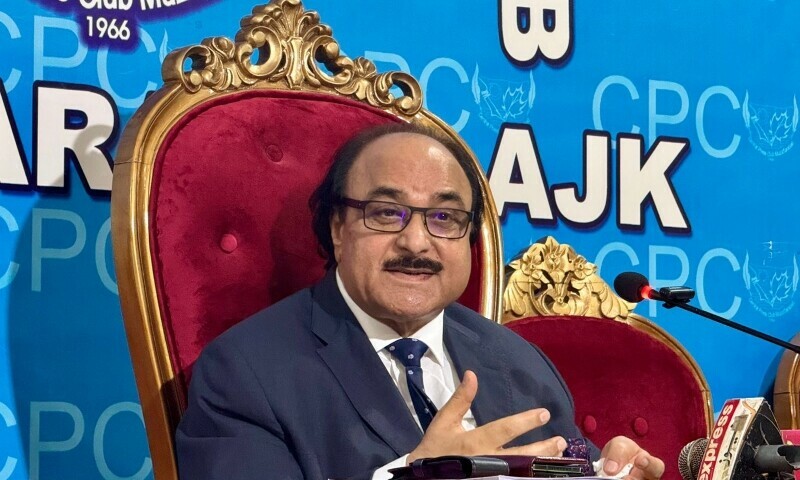Renowned Kashmiri jurist and rights advocate Dr Syed Nazir Gilani on Saturday said that India’s unilateral revocation of Jammu and Kashmir’s special status on August 5, 2019, was a grave violation of international law and called on Pakistan to pursue the issue on international forums.
On August 5, 2019, India’s Narendra Modi-led government stripped the Muslim-majority territory of its special status by repealing Article 370 of the constitution, splitting the former state into two territories directly ruled by New Delhi.
Pakistan observes Youm-i-Istehsal (Exploitation Day) to mark the anniversary of India revoking occupied Kashmir’s special autonomy and to show solidarity with Kashmiris.
Addressing a press conference in Muzaffarabad on Saturday, Dr Gilani, who heads the London-based Jammu and Kashmir Council for Human Rights (JKCHR), said the nature of Jammu and Kashmir’s accession to India on October 27, 1947, changed just 81 days later when India took the matter to the UNSC on January 15, 1948, and accepted a plebiscite under UN supervision.
“India had no legal or moral authority to unilaterally decide the future of the disputed territory,” he stressed.
He cited UNSC Resolution 91 of 1951, which not only reaffirmed the disputed status of Jammu and Kashmir but also cautioned the government of the occupied territory against taking any steps contrary to the framework laid down by the UN Commission for India and Pakistan (UNCIP).
“India’s claim of constitutional finality over Jammu and Kashmir stands nullified by binding international commitments. No domestic court can override these legal instruments,” Dr Gilani added, criticising the Indian judiciary for treating Kashmir purely as an internal matter.
He revealed that JKCHR had made a formal submission on this issue to the UN secretary general, which was subsequently published as a UN General Assembly document on June 9, 2021, further strengthening the legal case against India’s actions.
Dr Gilani emphasised that Pakistan, as a principal party to the Kashmir dispute, bore an even greater responsibility to protect and safeguard the Kashmiris’ right to self-determination.
He urged Islamabad to take the issue more vigorously to global forums, particularly Geneva and Washington, by introducing new faces and voices into its diplomatic efforts.
“The current geopolitical landscape and international public opinion are favourable to Pakistan. India’s atrocities in occupied Kashmir have created space for Pakistan to rally Kashmiris’ support for accession by responding to their suffering with concrete advocacy,” he noted.
Institutional inaction enabled India’s move
Dr Gilani strongly criticised the government of Azad Jammu and Kashmir (AJK) for failing to establish an institutional framework for a plebiscite, as envisaged in the Karachi Agreement, the AJK interim constitutions of 1970 and 1974, and the AJK High Court’s 1999 judgment on a JKCHR petition.
“India did not act in a vacuum. It took advantage of the permissive silence and institutional inaction of the AJK government,” he said.
“Had the 1999 High Court verdict been implemented and a plebiscite mechanism established in line with UN resolutions, the global perception of the Kashmir dispute would have been vastly different. This was a historic forfeiture of representation.”
He stressed the need to redefine AJK’s constitutional role, saying it was not a political charity but a moral and constitutional trustee of a disputed territory.
“The foremost responsibility of the AJK government is to articulate, defend, and develop the legal and political case of the people of Jammu and Kashmir,” he said.
Historical and human rights violations
Dr Gilani pointed out that until April 1959, Indian citizens required a permit to enter occupied Jammu and Kashmir, reflecting its distinct constitutional and political status. He said this status was systematically eroded by India through judicial manipulation and military aggression.
He also criticised India for breaching the original understanding on troop presence.
“Indian security forces were to be limited to 21,000 unarmed personnel, aiding civil administration under four bilateral agreements and three clauses of UNSC Resolution 47. Instead, India has deployed over one million heavily armed troops, violating UN resolutions and the original terms of engagement,” Gilani said.
He said thousands of political prisoners, including Syed Shabbir Shah, Yasin Malik, Zafar Akbar Bhat, Naeem Khan, Asiya Andrabi, and dozens of other women, remained in detention — most of them shifted to prisons outside the occupied territory.
“This is not just a political issue; it’s a humanitarian crisis, and it must be presented as such.”
Gilani said JKCHR had published five reports on Kashmiri prisoners and two on women from AJK and Pakistan stranded across the Line of Control, and that efforts were ongoing for their release and repatriation.
Water blockade and ‘crime against humanity’
Condemning India’s stoppage of natural water flows from Jammu and Kashmir into Pakistan, Dr Gilani called it a crime against humanity, which must be raised at international environmental and human rights forums.
“India has no authority under international law to halt the natural flow of rivers originating from a disputed territory. Blocking these waters constitutes water terrorism, and global institutions must take notice,” he said.
